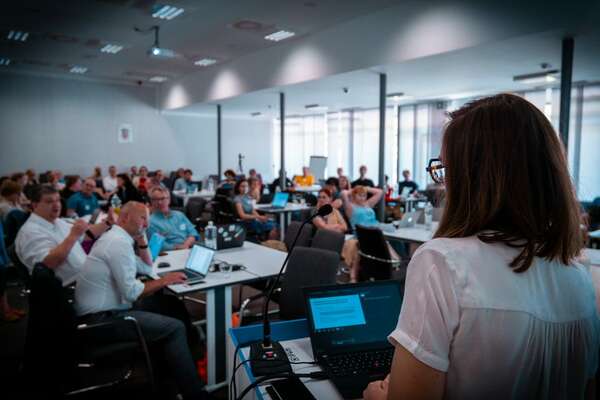
CESSDA Expert Seminar on Data Citation
On 11 June 2024, the CESSDA Expert Seminar on data citation gathered nearly 50 participants for a 3-hour session in Split, Croatia. The seminar focused on the activities of the CESSDA Data Citation Key Topic Working Group (WG) and particularly the CESSDA Recommendations on data citation.
In the introductory session, Christina Bornatici from FORS, the Swiss Service Provider (SP) for CESSDA, underscored the importance of data citation in scientific research and the key role that data repositories—and thus CESSDA SPs—can play. Data repositories provide essential components of a data citation, such as persistent identifiers, and facilitate data citation by raising awareness among data depositors, users, and other relevant stakeholders. They also enhance interoperability and connections between persistent identifiers (e.g., ORCID, ROR, and DOI).
Christina Bornatici then presented the activities of the CESSDA Data Citation Working Group aimed at enhancing and facilitating data citation practices. These activities include developing practical recommendations on data citation targeting key stakeholders, conducting outreach efforts, analysing Service Provider (SP) practices regarding data citation, and organising the expert seminar. An overview of the recommendations document was provided, detailing the anatomy of a data citation. The core components identified were data author(s), title, year, version, publisher, and persistent identifier, with additional components like data number, resource type, and place of publication also considered valuable. The recommendations target six stakeholder groups: data repositories, authors, journals and publishers, research-performing organisations (RPOs), high-level research policy and strategy development entities, and ethics committees.
The WG also conducted a survey of SP practices regarding data citation based on the specific recommendations for data repositories. Preliminary results were presented, showing that while all SPs adhered to fundamental practices such as providing core components of the data citation in the metadata and offering a data citation example for each dataset, more advanced features like dataset PID interoperability with other PIDs and simple export of the data citation components to the user's reference management system were adopted by only half of the SPs.
The subsequent session facilitated group discussions aimed at refining recommendations, developing ideas for effective outreach efforts, and identifying future activities. Participants were divided into groups moderated by WG members and focused on specific stakeholder groups targeted by the recommendations. They engaged in a critical analysis of the recommendations, ensuring clarity, appropriateness, and completeness. Brainstorming sessions yielded insights into effective communication tools and strategies for disseminating recommendations to diverse stakeholder groups, with a focus on prioritising target audiences. Participants also explored potential advancements in data citation and discussed leveraging new technologies to foster adoption and utilisation.
In the final joint discussion and summary session moderated by Brian Kleiner from FORS, designated representatives from each group summarised their discussions, fostering a collective understanding and synthesis of ideas. Key recommendations and strategies for outreach were discussed. The collaborative effort among CESSDA SPs aims to enhance data citation practices, contributing to the advancement of open science and research reproducibility. Overall, the seminar successfully addressed the importance of data citation, assessed and improved the recommendations for all targeted stakeholder groups, and collected ideas for outreach and future activities.